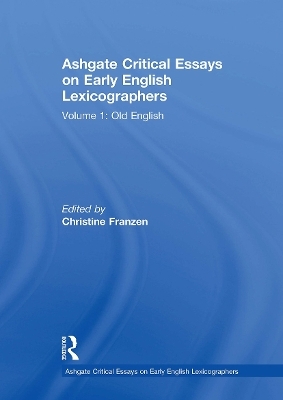
Ashgate Critical Essays on Early English Lexicographers
Routledge (Verlag)
978-1-032-91767-2 (ISBN)
Anglo-Saxon lexicography studies Latin texts and words. The earliest English lexicographers are largely unidentifiable students, teachers, scholars and missionaries. Materials brought from abroad by early teachers were augmented by their teachings and passed on by their students. Lexicographical material deriving from the early Canterbury school remains traceable in glossaries throughout this period, but new material was constantly added. Aldhelm and Ælfric Bata, among others, wrote popular, much studied hermeneutic texts using rare, exotic words, often derived from glossaries, which then contributed to other glossaries. Ælfric of Eynsham is a rare identifiable early English lexicographer, unusual in his lack of interest in hermeneutic vocabulary. The focus is largely on context and the process of creation and intended use of glosses and glossaries. Several articles examine intellectual centres where scholars and texts came together, for example, Theodore and Hadrian in Canterbury; Aldhelm in Malmesbury; Dunstan at Christ Church, Canterbury; Æthelwold in Winchester; King Æthelstan's court; Abingdon; Glastonbury; and Worcester.
Christine Franzen was formerly at the School of English, Film and Theatre with Media Studies, Victoria University of Wellington, New Zealand.
Contents: Introduction; Section 1 Introduction and Latin and Greek Sources: Old English glossaries: creating a vernacular, Antonette diPaolo Healey; On the nature and transmission of Latin glossaries, A.C. Dionisotti. Section 2 Early Old English Glossaries: The school of Theodore and Hadrian, Michael Lapidge; Early Anglo-Saxon glossaries and the school of Canterbury, J.D. Pheifer; The Werden glossary: structure and sources, A.N. Doane; Old English and Latin glosses to Aldhelm’s prose treatise on virginity and the ’Canterbury glossaries’, Scott Gwara; The Latin and Old English glosses in the ars Tatuini, Vivien Law. Section 3 Glossed Texts and Glosses as Texts: The scholarly achievements of Æthelwold and his circle, Loredana Lazzari; Isidore's Etymologiae and the Canterbury Aldhelm Scholia, Philip G. Rusche; The glossed manuscript: classbook or library book?, Gernot R. Wieland; Recent work on Old English glosses: the case of Boethius, R.I. Page; The Regularis Concordia and its Old English gloss, Lucia Kornexl; Latin learning at Winchester in the early 11th century: the evidence of the Lambeth Psalter, Patrick P. O'Neill; The hermeneutic style in 10th-century Anglo-Latin literature, Michael Lapidge; Contextualized lexicography, Patrizia Lendinara. Section 4 Late Old English Glossaries: Dioscorides' De materia medica and late Old English herbal glossaries, Philip G. Rusche; London, British Library, Cotton Otho E.i: a neglected Latin-Old English glossary, Phillip Pulsiano; A grammarian's Greek-Latin glossary in Anglo-Saxon England, Helmut Gneuss; Worcester books and scholars, and the making of the Harley glossary (British Library MS.Harley 3376), Jessica Cooke; The Irish contribution to Anglo-Latin hermeneutic prose, Jane Stevenson; The Antwerp-London glossary and Ælfric's Glossary. A record of the earliest English scholarship, David W. Porter; The earliest texts with English and French, David W. Porter; Leland's transcript of Ælfric's Glossary, Ronald E. Bucka
| Erscheinungsdatum | 16.10.2024 |
|---|---|
| Reihe/Serie | Ashgate Critical Essays on Early English Lexicographers |
| Verlagsort | London |
| Sprache | englisch |
| Maße | 174 x 246 mm |
| Gewicht | 1369 g |
| Themenwelt | Geisteswissenschaften ► Sprach- / Literaturwissenschaft ► Anglistik / Amerikanistik |
| Geisteswissenschaften ► Sprach- / Literaturwissenschaft ► Literaturwissenschaft | |
| ISBN-10 | 1-032-91767-9 / 1032917679 |
| ISBN-13 | 978-1-032-91767-2 / 9781032917672 |
| Zustand | Neuware |
| Informationen gemäß Produktsicherheitsverordnung (GPSR) | |
| Haben Sie eine Frage zum Produkt? |
aus dem Bereich


